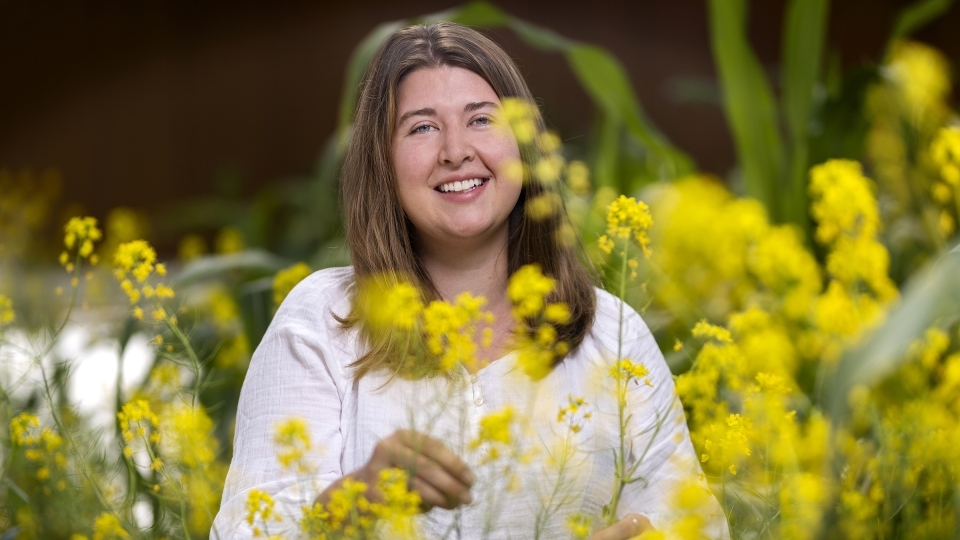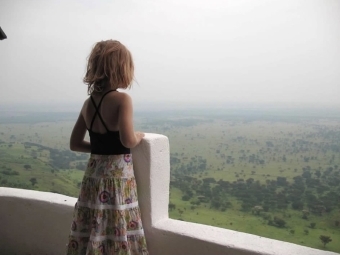Powered by Plants: Louisa Bartkovich ’22 Named Smith Scholar
May 13, 2022
- Author
- Mary Elizabeth DeAngelis

To Louisa Bartkovich, a plant isn’t just something that springs from the ground.
It’s a nurturing friend that heals bodies; an artist that paints the landscape with a beautiful brush; a hero that can save a starving child; and a brave soldier fighting off an aggressive invader.
That’s why you’ll often find her in the dirt, lovingly tending roots and buds, carefully studying how to help these frontline warriors save themselves—and the planet—from climate change.
“Plants need our love and our protection,” she said. “They need someone to listen and be a voice for them. I want to be that voice.”
Her commitment to people, plants and the planet has inspired many at Davidson College and in the surrounding community. The college has named Bartkovich ’22 as this year’s W. Thomas Smith Scholar.
The annual Smith award is modeled after scholarships like the Rhodes and Fulbright. It honors a graduating senior for outstanding academic achievement, leadership and community service. The scholarship pays for the student to pursue a master’s degree at a university abroad.
Bartkovich will receive her diploma at Davidson’s commencement ceremony on Sunday. She plans to attend the University of Toronto as a direct admit to their ecology and evolutionary biology doctoral program this fall. She’ll study the processes that enable plant resilience to unpredictable and challenging environmental conditions and, she said, “how we can help them.”
Childhood Wonderland
Bartkovich has always felt most comfortable in nature. She spent the first eight years of her life ensconced in the tight-knit cocoon of a remote Ugandan village. Her parents, Kevin and JD, joined a missionary team invited by the local community to help start a secondary school. Their team also worked closely with non-governmental organizations and community members on healthcare, education, sustainable farming and clean water projects.
“It was a collection of people working together, using their talents and expertise for the community good with a deep respect for biodiversity and the autonomy of local communities,” she said. “I grew up thinking that’s the way it was everywhere. As you get older, you realize that’s not always the case.”
She remembers long, idyllic days reading books by the window or playing outside, gathering spiders and snakes—"my parents had to step in and say, ‘you really shouldn’t do that’—so I started only observing them and collecting rocks instead.”
A huge mango tree shaded the front porch of her house. Like the rest of the school, her house was made of local mud, baked by the sun into bricks and painted with a white stucco. The house had wood shutters, bars on the windows and a blue metal roof. When it rained, which was often, the noise was deafening.
Louisa remembers her childhood, in the shadow of the snowcapped Rwenzori Mountains, as a wonderland. Pineapples sprouted from the ground in her mother’s papaya tree-canopied flower and vegetable gardens. Lime, jackfruit and frangipani trees provided a background for her playground and sand pile.

Kingfisher Lodge, Uganda, 2007
During school breaks they visited Malta, Greece, Kenya and Egypt, and she remembers marveling at the spectacular landscapes, rich cultures and delectable food. When they’d return to the United States to visit, she couldn’t wait to go back to Uganda. And when they left Uganda permanently, she felt a deep loss.
“I was extremely homesick,” she said. “Even then, I really loved the beauty of the world. I had no idea that certain parts of it were in such danger.”
The family took a 10-week-long trip to national and state parks so Louisa and her then-three siblings could learn about American history and geography. She became a junior ranger at some 40 parks, enjoying roles such as taking the geyser temperatures at Yellowstone National Park. She took the junior ranger pledge: “to protect, preserve and respect” nature and “share what I learn.”
And she has.
Selfless Teacher, Advocate, Scholar
For four years, the MacDonald/Bonner Scholar partnered with the Ada Jenkins Center LEARN Works Program in Davidson. In her leadership role as the enrichment coordinator, operations assistant and lead classroom volunteer, she provided critical after-school academic support to local at-risk elementary and middle school students. These weekly enrichment activities ranged from hands-on science experiments to planting a community garden. She also arranged virtual nature and art museum tours such as the Smithsonian’s, as well as cardio workouts with the college’s women’s track and field team when COVID-19 shut the world down in 2020.
And she filled in wherever needed. She volunteered to watch children at the center so their parents could attend night school ESL and GED classes there. She chaperoned field trips, trained other volunteers and put a plan into place for those who succeed her at the center.
“She is one of the most selfless volunteers that we have ever had in the LEARN Works program,” said Kateaka Brown, the center’s program operations coordinator. “She’s an advocate for children—she doesn’t ever want to see anyone left out or left behind.
“I’ve told her that whoever gets her as an employee or as a friend in the future is getting a real gem. I’m going to miss her so much, but I’m excited to see her go off and do great things. I have no doubts she’ll go out and change the world with whatever she does.”
At Davidson, she’s served as a teaching assistant, tutor and research leader. She has co-published one scientific paper. She’s now working on a publication with Susana Wadgymar and another with Chris Paradise, both Davidson professors with whom she’s taken classes and conducted research.
Both describe her as an accomplished writer and researcher: “highly motivated and extremely capable,” Paradise said. He called her work with a partner in an independent study of light pollution’s effects on insects “nothing short of outstanding.”
Bartkovich said her professors inspired her.
With Chris Paradise I learned to love research. After conducting research with Susana Wadgymar, I fell in love with the many wonders of plants. They are both highly qualified experts in their respective fields and have done so much to support me; I am extraordinarily lucky to have mentors like them.
In the summer of 2020, when the pandemic cancelled many research jobs, Bartkovich led 30 Davidson students and alumni in a collaborative, remote project charting plant growth and climate in 13 states along the East Coast. She shipped a box with pots, seeds and soil to each participant, then provided instructions for them to grow the plants outside their homes and collect daily flower production data. In the fall, she combined the data with satellite imaging and weather statin reports to measure the impact of environmental conditions on daily flower production.
When Bartkovich wanted to establish an outdoor space for Davidson students, professors, and local communities to study and appreciate native plant species, Wadgymar, an assistant biology professor who specializes in evolutionary plant ecology, worked with the college’s Physical Plant staff to find a patch of land. Bartkovich transformed the space outside the E. Craig Wall Jr. Academic Center into a garden that she and other students use as a research base.
Plants don’t often get their due.
“People think about polar bears and penguins and whales being affected by climate change,” Wadgymar said. “But plants are the organisms we generally interact with most of the time and people know astonishingly little about them. They are underappreciated, understudied and under acknowledged.
“Louisa sees how diverse they are, and how fundamental they are to many cultures around the world. She wants to share that information, and that knowledge and make sure it’s not lost to things like climate change.”
World of Extremes
Bartkovich grew up in a family that valued nature—and education.
Her father taught at the N.C School of Science and Math before becoming headmaster of the Christ School Bundibugyo in Bundibugyo, Uganda. He now teaches math at the prestigious Phillips Exeter Academy in New Hampshire, where Louisa attended as a faculty kid. Exeter, which educates some of the world’s wealthiest students, offered a vastly different experience from her early childhood.
“Foundationally, two experiences have built my world view and educational expectations. One as the well-resourced and protected mzungu child of missionaries serving an impoverished people group. Second as a middle-class faculty kid at one of the most elite boarding schools in the world,” she said. “My peers in high school came from families with positions of wealth and power, a world apart from mine.”
She said Exeter’s rigorous curriculum, innovative teaching and support helped prepare her for Davidson. She also played soccer, basketball and lacrosse, volunteered at her church, starred in the senior theater production, and spent time with her family.
“I learned how to manage my time, and I learned how to be competitive—with myself,” she said. “It’s never really been about the grade for me, it’s much more about how much I’ve learned.”
She’s enormously proud of and extremely close to her family.
Besides her older biological sibling Jo and two younger twin brothers Nate and Jasper “Sav,” she has younger brothers Peter, Josh, Blake and James, and a sister, Lexi, who were adopted from foster care in New Hampshire. She thinks about her younger siblings when teaching kids in the Ada Jenkins Center’s afterschool program.
“Sometimes it can be a little chaotic, but they’re so excited about learning,” she said. “Some of them struggle in traditional classrooms. I want to make sure they know they are important, that they are loved, understood and really wanted. I had a severe speech impediment and articulation issues when I was younger and started American public school in the fourth grade—I know the importance of having someone say, ‘you are smart, and you are needed.’’’
Big-hearted Friend
The pandemic has created tough times for many; and reinforced the importance of friends.
Marquia Humphries’s friendship with Bartkovich started during their first year at Davidson. Humphries ’22 had gone to her dorm’s lounge to watch a movie on her laptop when Bartkovich walked in and asked if she could watch it, too.
They’ve been watching movies and TV shows together ever since. (Bartkovich’s favorites: the movie It’s a Wonderful Life, and the TV show West Wing.) On some movie nights they’ll splurge on their go-to favorite pizzas, Domino’s thin crust with garlic-parmesan sauce—one with pepperoni and bacon, the other with chicken and bacon—and some mango-habanero wings.
“Louisa has been my person for all four years at Davidson,” Humphries said. “You know how some people can drain your energy? Louisa is someone who recharges your energy.
“She has a really good brain, it’s immediately evident that she’s super smart. She’s also sweet, compassionate and genuine. Some people are nice—Louisa is truly kind.”
Housemate and close friend Maddie Buitendorp ’22 said Bartkovich channels her passion into everything she does.
“If she’s going to do something it’s 110 percent—actually, beyond that—or not at all. I’ve seen her really thrive at Davidson, and it’s great that she’s getting this recognition,” Buitendorp said. “She’s so humble, she never makes a big to-do about the many things she does to help people. She has the biggest heart and cares so much that people, especially those who are disadvantaged or marginalized, are heard.”
As they prepare to graduate this weekend the roommates reminisce, sharing memories from their four years at Davidson. One they’ll never forget: Bartkovich’s early morning trips to the research garden.
“Even when it was freezing, she’d be out there,” Buitendorp said. “She’d come back covered in mud and looking so happy.”



